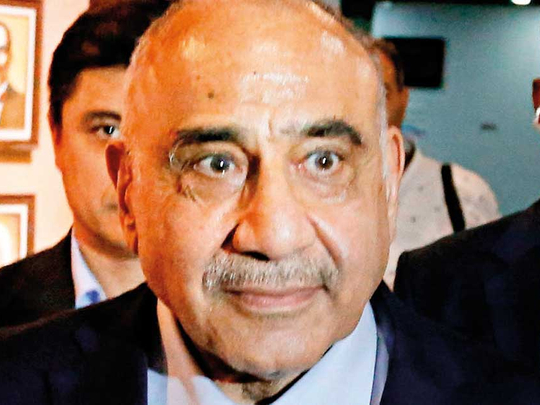
Damascus: Iraq’s Prime Minister-designate Adel Abdul Mehdi is expected to present his cabinet lineup on Tuesday or Wednesday, meeting a 30-day period specified by the Iraqi Constitution.
Leaks from Baghdad are stressing that the Abdul Mehdi cabinet will be a government of technocrats and independents, composed mainly of new faces. Thirty-five per cent of the cabinet is earmarked for independents.
Ali Allawi, a former Iraqi defence minister, told Gulf News: “There aren’t enough independent technocrats in Iraq to form a government. And does Dr Adel have the margin of independence to really form such a cabinet?” Now teaching at the National University of Singapore, Allawi added: “The cabinet will depend on four elements. One is the election results from last May. Second is Iran, where Iranian allies will have to be accommodated. Third will be the American element, which also needs to be taken into consideration. Fourth will be appointments made by the Prime Minister himself.”
Abdul Mehdi is thinking of expanding his government from 22 to 24, reviving the portfolios of women affairs and environment, and possibly, creating a cabinet for reconciliation. He is also going to re-create the post of deputy prime minister, cancelled under his immediate predecessor, Haidar Al Abadi. Before making his announcement, Abdul Mehdi declared that unlike previous premiers, he won’t be based in Baghdad’s Green Zone, which was carved out by the Americans after the invasion of 2003. Instead, he will move his offices into the heart of the Iraqi capital, tearing down roadblocks leading up to the Green Zone.
During last May’s parliamentary elections, the Sairoun bloc of Shiite cleric Muqtada Al Sadr won the lion’s share of seats – 54, a major increase from its earlier share of 34. Although having earlier expressed his support for Abdul Mehdi, a long-time ally, Al Sadr said that his followers would not join his government if sectarianism, corruption, and ethnicity defined the distribution of portfolios. “We refuse to return to Square One” he wrote on Twitter, adding that if any of the above are taken into consideration, “we will oppose the [government] from within the Chamber of Deputies”.
Coming in second was the party of Hadi Al Ameri, a staunch Iranian ally who leads the Popular Mobilisation Units, better known as Al Hashd Al Shaabi. Al Ameri — who had his own eyes trained on the premiership — emerged with a bloc of 48 MPs. Coming in at a distant third was the Victory Alliance of ex-Prime Minister Al Abadi, with 42 seats.
Given their numerical majority and dominance in parliament, Shiite parties are expected to get 12 out of 22 seats in the cabinet. In addition to Sairoun, the other major Shiite blocs are Nouri Al Maliki’s State of Law Coalition, which now has only 25 seats in parliament (down from 92), and Sadikoun, the political wing of Al Hashd Al Shaabi. Their allocation includes powerful ministries like electricity, health, foreign affairs, and interior — which for years after 2003, was run by Abdul Mehdi’s allies in the Supreme Council for Islamic Revolution in Iraq (SCIRI).
The Foreign Ministry, now in the hands of Ebrahim Al Jaafari, another ex-premier, is earmarked for Laith Kubbeh, who served as his spokesman back in 2005-2006. Kubbeh is close to both the Americans and Iranians, with a particularly warm relation with Grand Ayatollah Ali Sistani, and was a prominent figure in the Iraqi opposition against Saddam Hussain.
Other nominees for the portfolio of foreign affairs is Al Abadi.
In return for accepting permanent Shiite presence at the Ministries of Foreign Affairs and Interior, Iraqi Sunnis have settled for the Ministry of Defence, which has been their share of government since the days of Al Maliki. Earmarked for the post is Kamel Al Duleimi, 53, a former officer in the Iraqi Army and current MP for Anbar, the largest Sunni province. Trained at the Iraqi Military Academy, he worked as a professional officer under Saddam until the Iraqi Army was disbanded in 2003, moving quietly into the political arena, where he joined parliament in 2010, now heading a party called the “Political Correction Movement.”
In addition to the portfolio of defence, Sunni parties are expected to get the portfolios of commerce, industry, education, and finance.
Meanwhile, the Kurdish Democratic Party, which won 25 seats in Parliament, is seeking three posts in the Abdul Mehdi government — including finance as well as the Ministry of Refugee Affairs or Culture. They are also seeking to obtain one of the two posts of Deputy Prime Minister, either for services or security affairs.











